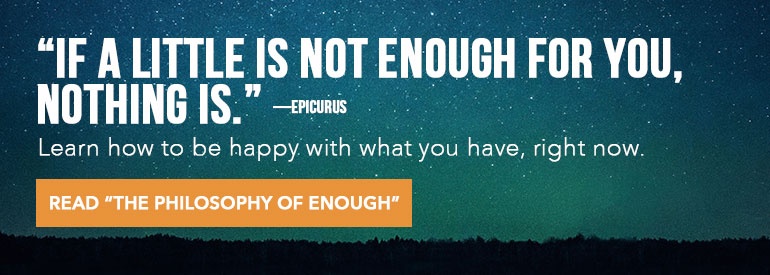 Reading Time: 6 minutes
Reading Time: 6 minutesI’m struck by how often people tell me they’re unhappy. We live in one of the most prosperous times in history, yet when I talk to people about what’s missing from their lives, most answers boil down to this: “I want to be happy.”
Which implies people don’t feel happy now.
As a society, we have more possessions, opportunities, and access to more resources than ever before. We’ve been urged by the purveyors of positivity to think optimistic thoughts, to cast away negativity, and to always focus on the bright side.
Yet among this cult of happiness, we seem unhappier than ever.
Conditions like chronic stress, anxiety, and depression are at an all-time high. Many people feel overwhelmed and exhausted. We spend our lives chasing one goal after another, fervently believing that happiness will arrive when we achieve a certain goal.
Have you ever thought, “I’ll be happy when I [buy a house, get a better job, have more money, find true love, lose weight, buy a car, get married, have children, retire, go on holiday]?”
Now be honest. Did reaching that goal suddenly bestow great feelings of happiness? Were you as happy as you thought you’d be? Did that feeling last as long as you thought it would?
The Happiness Conundrum
It turns out the things we think will bring happiness don’t always.
We tend to attach our happiness to an end goal, yet when we reach that goal, we often feel slightly disappointed. The anticipated level of happiness didn’t arrive, or it was short-lived, or the end-goal brought a series of unanticipated problems.
This realization poses a few questions:
- In our search for happiness, are we targeting the wrong things?
- Are we searching for happiness in the wrong places?
- Are we making ourselves miserable by constantly looking for happiness, which by default suggests we’re not happy now?
These are big questions. They force us to consider that perhaps we’ve been approaching happiness from the wrong angle.
So, if our search for happiness has lead us astray, what should we do instead?
Savor the Little Things
By attaching our happiness to the big things in life (i.e. getting the house, car, boat, holiday, promotion, etc.), we risk ignoring the little things that bring us joy. Turns out, it’s these everyday pleasures that predict our quality of life rather than achieving the big stuff.
We’re more likely to enjoy life — and feel happy — if we regularly do things we like.
This might include spending time with family, playing with your kids, sharing a meal with friends, reading a good book, playing sports, getting a massage, buying fresh flowers, painting, walking in nature, cooking, napping, gardening, dancing, or listening to music.
In addition, when we relish these moments and truly savor them, we increase the amount of happiness received from them.
Try this: Make a list of the little things that make you happy. Pick one and incorporate it into your day. When it happens, be fully present in the moment. Savor the experience by noticing what you see, hear, and feel. Afterward, write down how you felt. The next day, review what you wrote.
Having a good experience makes us happy. Savoring that experience afterward enhances that happiness.
Embrace the Negative
This is an uncomfortable proposition when, for most of our lives, we’ve been encouraged to think positively and to avoid negative experiences. But where there is positive there is negative. Our avoidance of “negative” emotions and experiences ignores a large part of the human condition.
Feelings of hurt, anger, sadness, guilt, frustration, uncertainty, pain, and regret are valid.
These feelings tell us something about our experience. They give us the opportunity to acknowledge what happened and how it differs from our expectations. These emotions provide impetus for growth, change, and creativity.
Put simply, avoiding these emotions ignores a large part of who we are. We cannot be happy if we don’t accept our entirety.
Try this: instead of suppressing these emotions, embrace them. Acknowledge them as a normal part of life. Remove the judgement that these are “negative” feelings or events. They’re neither positive or negative. They merely — are.
When we resist the urge to label experiences as either good or bad, we let go of the idea that they detract from our happiness.
Give Back
When you think about it, our search for happiness is self-centered. It’s all about our needs, our wants, and how we feel. There’s nothing inherently wrong with this. After all, it’s our life and we only get one.
However, if our focus becomes too narrow, we miss out on an important aspect of happiness — the joy of giving.
“Giving” can mean many things. Perhaps it’s volunteering to help at your child’s school, participating in community events, or raising funds for a charity. It may be paying for a stranger’s coffee, taking your sick neighbor’s dog for a walk, saying a kind word to the cashier at the grocery store, or helping your friend clean her kitchen.
When we’re generous, we feel better about ourselves and the recipient of our generosity. We’re less likely to focus on our own problems and more likely to appreciate what is right in the world. Giving and sharing improves our social interactions, makes us feel connected, and generates opportunities.
On a physiological level, giving also reduces stress, anxiety, and blood pressure while boosting the serotonin, endorphin, and oxytocin levels in your brain (i.e. the “happy” chemicals).
Try this: Think of one thing you could do to help others. Could you give your time, expertise, money, or support? Engage in one act of generosity this week. Notice how it makes you feel. Can you make it a regular part of your life? (Tip: if you’re stuck for ideas, type “random acts of kindness” into your favorite search engine).
Doing things for others makes us feel good. It boosts our happiness, enhances our sense of well-being, and helps us feel fulfilled. As a side benefit, it’s also contagious.
Run Your Own Race
As the saying goes, “Comparison is the thief of joy.” Just because someone else has a certain job, house, partner, or way of life, doesn’t mean you’ll be happy with the same thing.
Looking for the next “thing” to make you happy — merely because someone else has it and they seem happy — is a vicious cycle. There will always be someone who appears to have it better than you.
Instead, look for a deeper understanding of what brings you happiness. What are your hopes, desires, and dreams? Are they really yours, or are they things you think you “should” do?
Try this: Write down what you think will make you happy. Then test this assumption by using the Five Whys: Why will it make you happy? Why is that important to you? And why is that important to you? What difference will that make? And why will that matter? This exercise will help you discover if that goal is your own, and what’s driving it.
Happiness stems from being content with your own place in life and understanding your own desires, hopes, and dreams. Striving to attain something we think we should have will not lead to greater happiness.
You Can Be Happy Right Now
Some of the happiest people I know have experienced adversity, trauma, and negative experiences. Yet they are grateful for their lives, accepting of the hard times, and derive happiness from the here and now.
Happiness is not an end-goal. Regardless of your current circumstances, happiness is already here if you choose to see it.













